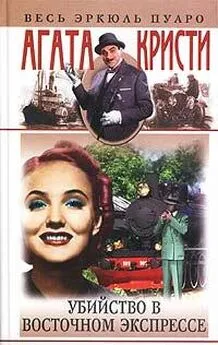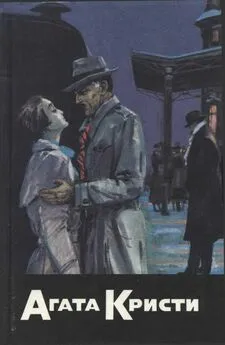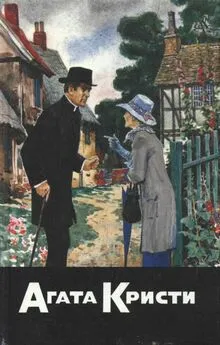Агата Кристи - Убийство в «Восточном экспрессе» / Murder on the Orient Express
- Название:Убийство в «Восточном экспрессе» / Murder on the Orient Express
- Автор:
- Жанр:
- Издательство:Литагент 1 редакция (7)
- Год:1934
- ISBN:978-5-04-114084-7
- Рейтинг:
- Избранное:Добавить в избранное
-
Отзывы:
-
Ваша оценка:
Агата Кристи - Убийство в «Восточном экспрессе» / Murder on the Orient Express краткое содержание
Убийство в «Восточном экспрессе» / Murder on the Orient Express - читать онлайн бесплатно ознакомительный отрывок
Интервал:
Закладка:
“A crime – it is all in the day’s work to you, eh?”
“It is naturally an unpleasant thing to have happen,” said Mary Debenham quietly.
“You are very Anglo-Saxon, Mademoiselle. Vous n’éprouvez pas d’émotion.”
She smiled a little.
“I am afraid I cannot have hysterics to prove my sensibility. After all, people die every day.”
“They die, yes. But murder is a little more rare.”
“Oh! certainly.”
“You were not acquainted with the dead man?”
“I saw him for the first time when lunching here yesterday.”
“And how did he strike you?”
“I hardly noticed him.”
“He did not impress you as an evil personality?”
She shrugged her shoulders slightly.
“Really, I cannot say I thought about it.”
Poirot looked at her keenly.
“You are, I think, a little bit contemptuous of the way I prosecute my inquiries,” he said with a twinkle. “Not so, you think, would an English inquiry be conducted. There everything would be cut and dried – it would be all kept to the facts – a well-ordered business. But I, Mademoiselle, have my little originalities. I look first at my witness, I sum up his or her character, and I frame my questions accordingly. Just a little minute ago I am asking questions of a gentleman who wants to tell me all his ideas on every subject. Well, him I keep strictly to the point. I want him to answer yes or no. This or that. And then you come. I see at once that you will be orderly and methodical. You will confine yourself to the matter in hand. Your answers will be brief and to the point. And because, Mademoiselle, human nature is perverse, I ask of you quite different questions. I ask what you feel, what you think. It does not please you, this method?”
“If you will forgive my saying so, it seems somewhat of a waste of time. Whether or not I liked Mr. Ratchett’s face does not seem likely to be helpful in finding out who killed him.”
“Do you know who the man Ratchett really was, Mademoiselle?”
She nodded.
“Mrs. Hubbard has been telling everyone.”
“And what do you think of the Armstrong affair?”
“It was quite abominable,” said the girl crisply.
Poirot looked at her thoughtfully.
“You are travelling from Baghdad, I believe, Miss Debenham?”
“Yes.”
“To London?”
“Yes.”
“What have you been doing in Baghdad?”
“I have been acting as governess to two children.”
“Are you returning to your post after your holiday?”
“I am not sure.”
“Why is that?”
“Baghdad is rather out of things. I think I should prefer a post in London if I can hear of a suitable one.”
“I see. I thought, perhaps, you might be going to be married.”
Miss Debenham did not reply. She raised her eyes and looked Poirot full in the face. The glance said plainly: “You are impertinent.”
“What is your opinion of the lady who shares your compartment – Miss Ohlsson?”
“She seems a pleasant, simple creature.”
“What colour is her dressing-gown?”
Mary Debenham stared.
“A kind of brownish colour – natural wool.”
“Ah! I may mention without indiscretion, I hope, that I noticed the colour of your dressing-gown on the way from Aleppo to Stamboul. A pale mauve, I believe.”
“Yes, that is right.”
“Have you any other dressing-gown, Mademoiselle? A scarlet dressing-gown, for example?”
“No, that is not mine.”
Poirot leant forward. He was like a cat pouncing on a mouse.
“Whose, then?’
The girl drew back a little, startled.
“I don’t know. What do you mean?”
“You do not say, ‘No, I have no such thing.’ You say, ‘That is not mine.’ Meaning that such a thing does belong to someone else.”
She nodded.
“Somebody else on this train?”
‘Yes.”
“Whose is it?”
“I told you just now: I don’t know. I woke up this morning about five o’clock with the feeling that the train had been standing still for a long time. I opened the door and looked out into the corridor, thinking we might be at a station. I saw someone in a scarlet kimono some way down the corridor.”
“And you don’t know who it was? Was she fair, or dark, or grey-haired?”
“I can’t say. She had on a shingle cap and I only saw the back of her head.”
“And in build?”
“Tallish and slim, I should judge, but it’s difficult to say. The kimono was embroidered with dragons.”
“Yes, yes, that is right – dragons.”
He was silent a minute. He murmured to himself. “I cannot understand. I cannot understand. None of this makes sense.” Then, looking up, he said:
“I need not keep you further, Mademoiselle.”
“Oh!” She seemed rather taken aback but rose promptly. In the doorway, however, she hesitated a minute and then came back.
“The Swedish lady – Miss Ohlsson, is it? – seems rather worried. She says you told her she was the last person to see this man alive. She thinks, I believe, that you suspect her on that account. Can’t I tell her that she has made a mistake? Really, you know, she is the kind of creature who wouldn’t hurt a fly.”
She smiled a little as she spoke.
“What time was it that she went to fetch the aspirin from Mrs. Hubbard?”
“Just after half-past ten.”
“She was away – how long?”
“About five minutes.”
“Did she leave the compartment again during the night?”
“No.”
Poirot turned to the doctor.
“Could Ratchett have been killed as early as that?”
The doctor shook his head.
“Then I think you can reassure your friend, Mademoiselle.”
“Thank you.” She smiled suddenly at him, a smile that invited sympathy. “She’s like a sheep, you know. She gets anxious and bleats.”
She turned and went out.
Chapter 12
The Evidence Of The German Lady’s-Maid
M. Bouc was looking at his friend curiously.
“I do not quite understand you, mon vieux. You were trying to do – what?”
“I was searching for a flaw, my friend.”
“A flaw?”
“Yes – in the armour of a young lady’s self-possession. I wished to shake her sang-froid. Did I succeed? I do not know. But I know this: she did not expect me to tackle the matter as I did.”
“You suspect her,” said M. Bow slowly. “But why? She seems a very charming young lady— the last person in the world to be mixed up in a crime of this kind.”
“I agree,” said Constantine. “She is cold. She has not emotions. She would not stab a man— she would sue him in the law courts.”
Poirot sighed.
“You must, both of you, get rid of your obsession that this is an unpremeditated and sudden crime. As for the reasons why I suspect Miss Debenham, there are two. One is because of something that I overheard, and that you do not as yet know.”
He retailed to them the curious interchange of phrases he had overheard on the journey from Aleppo.
“That is curious, certainly,” said M. Bouc when he had finished. “It needs explaining. If it means what you suspect it means, then they are both of them in it together – she and the stiff Englishman.”
Poirot nodded.
“And that is just what is not borne out by the facts,” he said. “See you, if they were both in this together, what should we expect to find? That each of them would provide an alibi for the other. Is not that so? But no – that does not happen. Miss Debenham’s alibi is provided by a Swedish woman whom she has never seen before, and Colonel Arbuthnot’s alibi is vouched for by MacQueen, the dead mans secretary. No, that solution of the puzzle is too easy.”
“You said there was another reason for your suspicions of her,” M. Bouc, reminded him.
Poirot smiled.
“Ah! but that is only psychological. I ask myself, is it possible for Miss Debenham to have planned this crime? Behind this business, I am convinced, there is a cool, intelligent, resourceful brain. Miss Debenham answers to that description.”
M. Bouc shook his head.
“I think you are wrong, my friend. I do not see that young English girl as a criminal.”
“Ah! Well,” said Poirot, picking up the last passport. “To the final name on our list. Hildegarde Schmidt, lady’s-maid.”
Summoned by the attendant, Hildegarde Schmidt came into the restaurant car and stood waiting respectfully. Poirot motioned her to sit down. She did so, folding her hands and waiting placidly till he questioned her. She seemed a placid creature altogether – eminently respectable, perhaps not over-intelligent.
Poirot’s methods with Hildegarde Schmidt were a complete contrast to his handling of Mary Debenham. He was at his kindest and most genial, setting the woman at her ease. Then, having got her to write down her name and address, he slid gently into his questions.
The interview took place in German.
“We want to know as much as possible about what happened last night,” he said. “We know that you cannot give us much information bearing on the crime itself, but you may have seen or heard something that, while conveying nothing to you, may be valuable to us. You understand?”
She did not seem to. Her broad, kindly face remained set in its expression of placid stupidity as she answered:
“I do not know anything, Monsieur.”
“Well, for instance you know that your mistress sent for you last night.”
“That, yes.”
“Do you remember the time?”
“I do not, Monsieur. I was asleep, you see, when the attendant came and told me.”
“Yes, yes. Was it usual for you to be sent for in this way?”
“It was not unusual, Monsieur. The gracious lady often required attention at night. She did not sleep well.”
“Eh bien, then, you received the summons and you got up. Did you put on a dressing-gown?”
“No, Monsieur, I put on a few clothes. I would not like to go in to her Excellency in my dressing-gown.”
“And yet it is a very nice dressing-gown – scarlet, is it not?”
She stared at him.
“It is a dark blue flannel dressing-gown, Monsieur.”
“Ah! continue. A little pleasantry on my part, that is all. So you went along to Madame la Princesse. And what did you do when you got there?”
“I gave her massage, Monsieur, and then I read aloud. I do not read aloud very well, but her Excellency says that is all the better – so it sends her better to sleep. When she became sleepy, Monsieur, she told me to go, so I closed the book and I returned to my own compartment.”
“Do you know what time that was?”
“No, Monsieur.”
“Well, how long had you been with Madame la Princesse?”
“About half an hour, Monsieur.”
“Good, continue.”
“First, I fetched her Excellency an extra rug from my compartment. It was very cold in spite of the heating. I arranged the rug over her, and she wished me good night. I poured her out some mineral water. Then I turned out the light and left her.
“And then?”
“There is nothing more, Monsieur. I returned to my carriage and went to sleep.”
“And you met no one in the corridor?”
“No, Monsieur.”
“You did not, for instance, see a lady in a scarlet kimono with dragons on it?”
Her mild eyes bulged at him.
“No, indeed, Monsieur. There was nobody about except the attendant. Everyone was asleep.”
“But you did see the conductor?”
“Yes, Monsieur.”
“What was he doing!”
“He came out of one of the compartments, Monsieur.”
Читать дальшеИнтервал:
Закладка:







